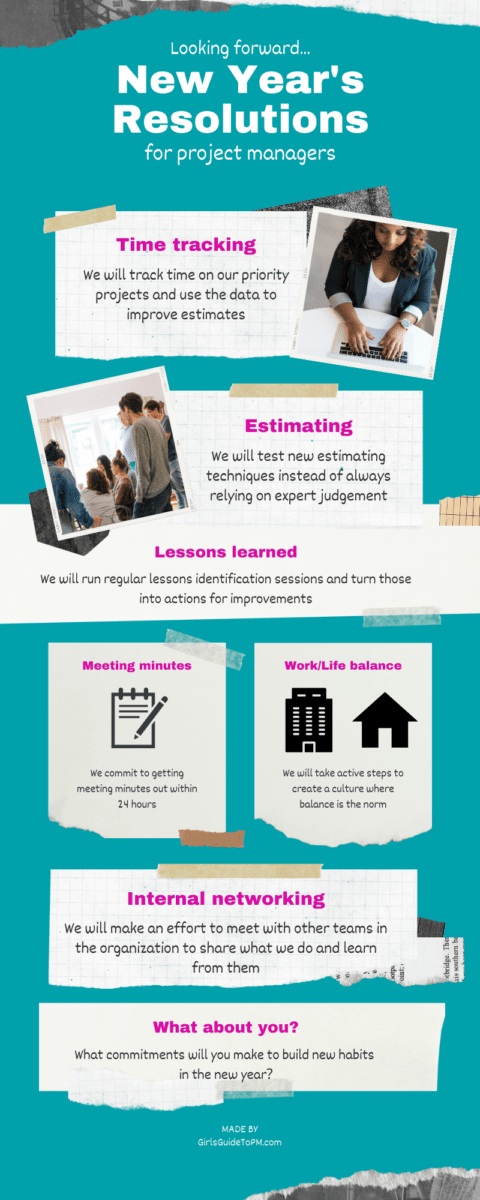Project Management New Year’s Resolutions for 2026
Another year is here already, and as project managers it’s the perfect moment to reflect on what worked (and what didn’t) in the year gone by, and to commit to changes that make 2026 more productive, more fulfilling, and more sustainable professionally.
Resolutions aren’t just about lofty goals on 1 January. They’re about turning intention into habit. Research published by Forbes shows that resolutions often fail when they’re vague or overly ambitious, whereas structured habits and measurable aims stand a much better chance of sticking.
This year, let’s focus on resolutions that help us build stronger teams, make better use of technology, nurture wellbeing, and drive consistent delivery excellence.
Time tracking
We will track time on priority work and use the data to improve planning and estimation.
Time tracking isn’t about micromanagement, it’s about visibility. Use time data to validate estimates on future work, identify bottlenecks, and inform scheduling. Encourage clarity around project codes and categories so the effort spent is connected to the right initiatives.
Estimating
We will diversify our estimating techniques instead of relying only on intuition.
Professional judgement is valuable, but combining that with structured methods like parametric estimating or ranges based on historical data leads to more credible forecasts. Test new approaches where possible and capture the results for continuous refinement.
We will test new estimating techniques instead of always relying on professional judgement.
Options we’ll look at include Rough Order of Magnitude and parametric estimating.
Lessons learned
We will run regular lessons learned sessions and turn those into documented actions.
Make “lessons learned” a built-in step of your project lifecycle rather than an afterthought. Use a central repository for insights, and reference it in planning future work. A clear agenda and the right mix of voices in these sessions helps ensure they produce actionable improvements.
We’ll have a clear agenda for lessons learned meetings and invite the right people to contribute.
Top tip for lessons learned: if you want to run several sessions with different audiences and then combine the results, that’s fine. It’s something we talked about in our Project Management Rebels group mentoring call recently.
Meeting minutes
We will commit to getting meeting minutes out within 24 hours, and only when they add value. And use AI tools like Copilot to make this work as minimally burdensome as possible!
Commit to sharing minutes within 24 hours of project or decision meetings. Where feasible, adopt automation tools (such as smart transcription or AI assistants) to reduce manual effort.
And we will stop doing meeting minutes for meetings where they are not needed, for example where the key actions and decisions are tracked in an action log, and further notes aren’t required.
Work/life balance and wellbeing
We will prioritise work/life integration and physical and mental wellbeing.
Work/life “balance” is an ongoing cultural shift, not a checkbox. Recognize that sustainable performance requires rest, boundaries around out-of-hours work, and respect for personal time. Schedule breaks, honor annual leave, and create space for wellbeing activities rather than treating them as extras.
Internal networking and collaboration
We will deepen cross-team relationships and broaden organisational insight.
Make time to connect with other teams, share best practice, and understand how different functions operate. Strong internal networks improve communication, reduce silos, and increase the likelihood that project work aligns with broader organisational goals.
Professional networking is important so we’ll invite other teams to our team huddles so they can present what they do, and we’ll return the favor.

Adopt and understand AI capabilities
We will get curious about how AI can support project delivery.
Artificial intelligence is now a practical part of many PM toolsets. Explore how AI features in your platforms (from scheduling insights to automated reporting) can reduce manual work and surface insights faster. Evaluate tools critically and choose those that enhance decision-making rather than distract from it.
Stay connected to your PMO
We will maintain active engagement with our PMO and governance structures.
If your organisation has a PMO, build an ongoing connection rather than a transactional one. Make sure you understand the latest standards, frameworks, and expectations so that project delivery remains aligned with enterprise priorities.
Build sustainable habits, not just resolutions
We will break resolutions down into sustainable habits.
Instead of one-off proclamations, frame your goals as repeatable behaviours with clear signals of success. Whether it’s a weekly sync on risk registers or quarterly review of team priorities, aim for routines you can sustain throughout the year.
How to use this list
This isn’t a checklist to impose but a conversation starter with your team. Co-create your own set of priorities together, align them with organisational strategy, and display them where everyone can see progress.
Do any of these strike a chord with you? If not, that’s perfectly fine, by all means write your own for personal and team use. Why not come over to the Project Management Cafe Facebook group and share them with us there?
